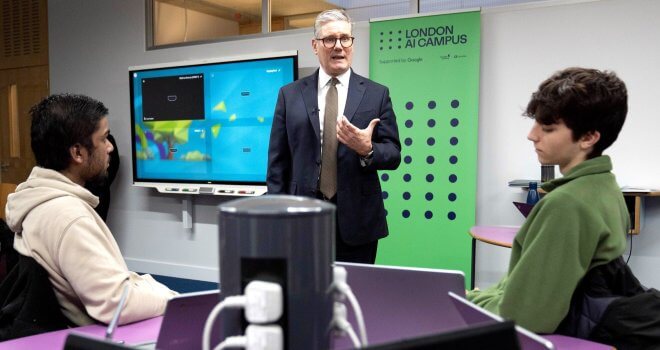Promoting Knowledge Sharing While Protecting It From Competitors: Learning From Physicists

Effective knowledge sharing constitutes a crucial part of the process by which innovation arises and managing the flows of knowledge is crucial for the enhancement of competitive advantage. This is even more evident nowadays as we reach the three-year mark from the beginning of the pandemic, and we witness situations in which employees work across different locations, in a range of solutions going from in-person to hybrid to remote.
While the distribution of knowledge across different locations can lead to novel ways to recombine ideas and the emergence of new strategies, it can also lead to knowledge dispersion, with the risk of competitors appropriating this knowledge. Formal mechanisms exist to protect companies from knowledge leakages to competitors, such as legal barriers or financial incentives.
However, it is also possible to act upon employees’ intrinsic motivation, encouraging them to share and use knowledge according to organisational goals. In particular, the organisational climate (that is employees’ shared perception of the working environment and culture of the organisation they work for) can be used by managers as a lever to control knowledge flows and encourage knowledge sharing within rather than across company boundaries.
In our study*, we present key insights on how to leverage organisational climate to manage the flow of knowledge, and we use an atypical context to draw these insights: a research centre for physics research. We believe managers can learn a lot from this context. In fact, the work of physicists is characterised by high levels of collaboration to enhance scientific discoveries, and high levels of competition to claim priority on these discoveries.
Physicists also work across different institutions and countries when collaborating on a project, and managing information is essential to ensure the enhancement of scientific results. Our insights derive from a study on ATLAS and CMS, two different research groups within CERN, the European Organisation for Nuclear Research. Studying them was an incredible opportunity to observe two organisational entities that are both collaborating and competing with one other. Looking at how the two organisations protect knowledge from being leaked to competitors allowed us to develop crucial insights for managers of knowledge-intensive companies.
Key insights on organisational climate
We observe that employees are more likely to share knowledge with their colleagues when they perceive that they are an integral part of the organisation they belong to. Managers can increase this perception by developing specific practices that make employees aware of the important role they play in the organisation, and how they can contribute to the collective goals of that organisation. By contrast, we notice that those employees who work in a more competitive organisational climate, where they are encouraged to outperform their colleagues, are more likely to share knowledge with their competitors than with their own colleagues.
This behaviour may put the organisation at risk when leading competitors acquire crucial information they can use to their advantage. We suggest managers should therefore be very careful when fostering a competitive climate: while possibly enhancing the performance of individual employees, it may also encourage them to misuse knowledge which belongs to the organisation.
Our results further show that, even in such organisational climates, organisations can redirect knowledge flows internally by acting on two levers at the individual level – job design and socialisation regime.
Job design
We observe that employees in managerial positions are less likely to transfer information to competitors, probably because they are more likely to internalise an organisation’s rules and ensure that their team members follow these rules. At the same time, employees with less experience seem more likely to share with competitors, most likely with the goal to gain visibility and thereby advance their careers. This implies that not only should managers use job design to determine and clarify the responsibilities of employees, but they can also use it to influence employees’ attitudes, behaviours, motivation, and commitment. For instance, managers could consider pairing one member of a team who has less experience with another member who has more, the aim being to balance the tendency of less experienced ones to share knowledge across organisational boundaries. At the same time, giving a position of responsibility to an employee could increase their tendency to share knowledge within the organisation.
Socialisation regime
The physical location of employees and the way they socialise can also impact knowledge sharing. In our research, employees based in the headquarters were more likely to share knowledge with their colleagues, and not to give it away to competitors. This may be because easier opportunities to socialise on a regular basis with colleagues contributes to a greater feeling of ‘belonging’ to the organisation. To spread this sense of belonging to those colleagues who are more distantly based from headquarters, managers can organise opportunities for those employees to be in touch and interact with the ‘closer’ colleagues, and not just through virtual interactions, but by facilitating in-person interactions – all with the goal of responsibly managing the flow of knowledge.
Final thoughts
Organisational climate should not be considered peripheral to an organisation. By acting on organisational climate, managers can align the interests of employees with those of the organisation and motivate them not to act opportunistically. This means focusing on team results rather than individual results. Managers should also be aware that different units within the same organisation, or even different teams within the same unit, can develop extremely different organisational climates. By acting through job design and socialisation regimes, managers can reorient the climate of each unit according to its own ‘personality’.
By Prof Maria Rita Micheli, IESEG
*Di Stefano, Giada and Micheli, Maria Rita, To Stem the Tide: Organizational Climate and the Locus of Knowledge Transfer, Organization Science, 0 (0) 1–28 https://pubsonline.informs.org/doi/10.1287/orsc.2021.1551




